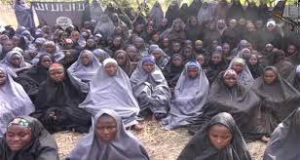 82 Chibok schoolgirls were released to the federal government of Nigeria by terrorists, last week.
82 Chibok schoolgirls were released to the federal government of Nigeria by terrorists, last week.
The girls were part of the 276 abducted by Boko Haram insurgents from their school dormitory in April of 2014.
Al Jazeera notes that “the release is the biggest since” the night of the abduction.
113 remain in Boko Haram custody.
However, notes Al Jazeera, “the ordeal is not over for the freed girls and their families”.
There have been complaints from some members of the families of the first batch of 21 schoolgirls who were set free from Boko Haram clutches in October of 2016.
Peter Joseph, an Uncle of one of the freed girls, told Al Jazeera’s The Stream, that the federal government hasn’t made it any easy for the affected families.
According to Joseph, more than six months later, his niece, Sarah, is still in a government rehabilitation camp where the girls rarely see their families.
“We were very happy to learn of the news that she was released,” he told The Stream. “But we are not very much impressed with the way the government is handling the whole rehabilitation process.”
Since her release, he’s only seen his niece once, when he traveled to Chibok last December, says Joseph.
Even then, he says, there were set time limits on visits, and many topics – like her experience as a prisoner – were off limits.
Joseph disclosed that he calls her often, but says she is only allowed to talk for two-three minutes before being cut off.
He says his niece has told him that “only females can sneak in to see them sometimes but males are not allowed into the compound.”
“Nobody is allowed to see them,” he says. “So it’s like another imprisonment, but this one has to do with the government.”
The federal government has said the girls will need to be de-radicalised, undergo medical examination and receive psycho-social support from trained experts before they’ll be allowed to reunite with their families.
Minister for women affairs, Aisha Alhassan, has also said parents of the freed girls are free to phone-in or pay their daughters visits in Abuja, the country’s capital.
Alhassan also said the girls will remain in the custody of the federal government pending when they are certified psychologically okay to rejoin their kith and kin.
Support InfoStride News' Credible Journalism: Only credible journalism can guarantee a fair, accountable and transparent society, including democracy and government. It involves a lot of efforts and money. We need your support. Click here to Donate
